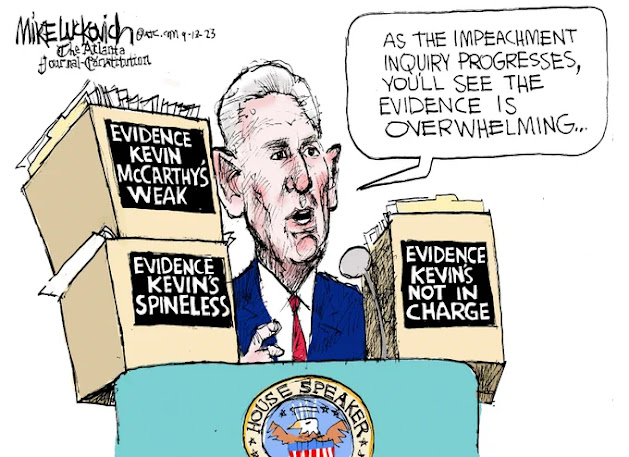Friday, September 29, 2023
Monday, September 25, 2023
NEW INC. MAGAZINE COLUMN FROM HOWARD TULLMAN
Don't Gamble with Your Tech Security
This week's cyberattacks in Las Vegas are yet another
reminder that you can't be passive about protecting your network and other
digital assets. You need to relentlessly remind all team members that they each
have a role, every day, in protecting the company--and their jobs.
BY HOWARD
TULLMAN, GENERAL MANAGING PARTNER, G2T3V AND CHICAGO HIGH TECH
INVESTORS@HOWARDTULLMAN1
Watching the hapless
victims of a cyberattack as portrayed on The Morning Show -- running
around like headless chickens while clueless executives demand instant
protection from the just-arrived outside team of white-hat hackers -- I was
painfully reminded of just how interconnected we all are by our devices. And
how exposed and vulnerable every business is to network intrusions by
criminals, along with the extortionate ransom demands that typically accompany
them.
When people returned to
the office, they brought with them all the shortcuts, compromises, simplistic passwords and other bad habits
they've adopted working remotely, along with all the crap and viruses their
kids have inadvertently loaded on their laptops and home networks. Now's the
time for companies to refocus and redouble their efforts to protect themselves, their
people, their customers, their networks, and their digital assets from the
risks and increasing likelihood that they are cyberattack targets. Remember, it
wasn't raining when Noah built the ark.
The trouble is that
until they've been the victim of identity theft or had a check ripped off from
the mail, everyone and every business of whatever size thinks that it won't
happen to them. You can explain the risks, the economic
and reputational costs, the relatively inexpensive preventative steps, and
everything else to smart and otherwise prudent and rational entrepreneurs and
corporate executives. But you can't understand for them.
An excellent case in
point: two of the largest casinos in Las Vegas just got hit by cyberattacks
with Caesars paying millions in ransom (without sharing any of that information
on the Strip) shortly before MGM got hit with a similar attack. We've
been led to believe by Hollywood heist movies that it's incredibly tough to
take on a casino because of massive security and surveillance technology. Guess
not. You can't really stop what you can't see and keeping ahead of the hackers
is more difficult every day. You either pay up front for the protection that is
available and keep your fingers crossed or you pay after the fact for the failure
and hope it doesn't happen again.
In the recent Morning Show episode,
the head honchos at the UBA network were ultimately unwilling to pay a $50
million ransom although it appeared that the network could come
up with the cash. Obviously, this is far from the case for most companies
and institutions. And, in the typical circumstances of any startup or
relatively new business, a substantial and unpayable demand would very likely
mean the death of the firm.
Startups are rarely
sitting on piles of cash; investors never want to see their funds going out the
door to pay ransoms; and new business builders almost never spend scarce
dollars on insurance. Apart from the D&O insurance which their
investors demand, it's a one-in-a-million prospect that they've purchased
sufficient business interruption protection to cover cyberattacks.
Entrepreneurs believe in passion and promotion, but rarely commit appropriately
to downside protection. One of the clearest COVID-19 lessons was just how
strapped and skinny millions of startups are and how little thought and money
they had committed to resilience and backing up their businesses and their data
securely offsite.
To me, the show actually
had a far more important message, especially for executives and senior managers
charged with cybersecurity responsibilities. The episode tracked the responses
and reactions of the various junior and senior staff members to the crisis.
Whether through stupidity, selfishness, or inadvertent subversion, several main
characters completely ignore the experts' very specific directions to surrender
their mobile phones to contain the spread of the virus. Worse yet, despite
being told that the corrupted phones represented further risks of damage, they
stealthily snuck off to make personal calls. Which reminded me of an old
truism: men are not against you; they are merely for themselves.
The point is that no one
has the luxury of acting alone because there’s really no digital environment
that’s absolutely isolated, insulated, or secure. Every system is subject to
human intervention, frailty, ignorance, and self-interest. If your team
doesn’t seriously commit to help secure your systems, it’s just a matter of
time before you suffer. A little inconvenience and some simple precautions can
avoid a ton of disruption. And, as a recent Deloitte survey shows,
the risk isn’t where you expect it. Gen Z is, in fact, many times more likely
to fall for these schemes as older employees. Turns out, they only think
they’re a lot smarter and computer-savvy than you.
There are three major
messages that senior management needs to carefully and consistently deliver,
and also demonstrate and validate through their own actions. An example or two
of conscientious compliance by the boss is worth a million words.
First, make it
absolutely clear that the concerns expressed about system security aren't nags
or nuisances, they're necessities. They represent existential risks to the
business, and the safeguards that have been implemented aren't casual or
suggested, they're mandatory and will be strictly enforced with zero tolerance.
But just saying it doesn't make it so. Your whole organization needs to live
it.
Second, it's far too
easy for people to assume that these matters are someone else's
responsibilities and especially to hand it off to the IT guys and let them worry about
it. That's misdirected: the vast majority of breaches
aren't super-sophisticated or driven by complex technical intrusions. They're
the result of simple sloppiness, stupid reuse of the same passwords, laziness
in terms of updating software, and, of course, social engineering, which rarely
has anything to do with the technical aspects of your systems. You want your
people to be helpful when asked, but, in these precarious times, a fair amount
of caution, suspicion, and confirmation makes a lot of sense. Keep in mind
that 91% of all known cyberattacks start with email phishing.
Third, one ongoing
problem is that the fraud phishers and the hungry hackers have increasingly
adopted two strategies: (1) they constantly use fake Microsoft logos and
language to misleadingly alert users to the falsehood that their passwords need
to be changed before they expire or are turned off by Microsoft; and (2) as the
year ends, they will again be sending millions of fake emails with titles
relating to year-end comp changes, salary adjustments, and bonuses, which
appear to be coming from internal HR departments. They're not, but they
are close to irresistible in terms of the temptation to open them. Now is a
very good time -- since October is National Cybersecurity Awareness month - to
remind your team about these two schemes in particular and also to consider how
best to distinguish your legitimate communications from the noisy and cluttered
mess.
None of this is easy to
pull off, but all of this is critical right now to get out ahead of the
problem, to the extent that's possible. Sharing stories from other companies
and articles about attacks and breaches that have been hit is somewhat helpful,
but sadly, most people still won't believe that these things can happen to them.
Until they do.
SEP 26, 2023
Sunday, September 24, 2023
We've got presidents who think that if they do something it by definition can't be against the law. We've got SCOTUS justices who feel they should not adhere to ethics rules or be criticized. We've got Senators who defend antiquated rules that grant each of them (or a minority of them) the power to stop progress on any issue ...and who value their club so much they won't speak out against obvious crimes. We have members of the House who feel they do not have to honor legal subpoenas, fulfill their duty to their constituents or honor the Constitutional definition of what constitutes an impeachable offense. We have state legislatures and governors that seek to ignore the will of the people and to reverse the results of elections without any legal grounds or justification. These abuses happen daily. Our system has become deeply and profoundly corrupt. We are in a slow motion constitutional crisis, one in which our governing ideals and principles have been gutted to serve the personal and partisan ambitions of a few--officials and donors alike. Don't underestimate the severity of this situation. Authoritarianism doesn't require a coup to assume power and snuff out democracy.
Saturday, September 23, 2023
Friday, September 22, 2023
Thursday, September 21, 2023
Wednesday, September 20, 2023
Tuesday, September 19, 2023
NEW INC. MAGAZINE COLUMN FROM HOWARD TULLMAN
You Can't Build Culture in a Cloud
Zooming in can lead to
zoning out, or worse: when everyone feels compelled or entitled to share
whatever they're thinking. (Please spare us.) Here are four rules to bring some
discipline to every discussion.
BY HOWARD
TULLMAN, GENERAL MANAGING PARTNER, G2T3V AND CHICAGO HIGH TECH
INVESTORS@HOWARDTULLMAN1
I've spent a lot of
painful time lately in interminable Zoom meetings wondering if things will ever
get better or whether we're all just forever mired in this anhedonic rut.
Drifting off into these depressing queries is easy when you're stuck for hours
in front of a monitor and staring at your firm's infinitely less entertaining
version of digital Hollywood Squares. Anyone who suggests that you
can accomplish any meaningful interaction with your team or any effective
engagement with a group over Zoom or Teams simply doesn't understand how humans
interact, or how important body language, accurate voice tones, and posture are
to EQ. And how difficult it is to tell a joke to a remote audience.
The only difference
between a rut and a grave is the depth, and I fear that the endless hours we're
wasting in these sterile endeavors attempting unsuccessfully to share and
communicate are, in fact, slowly draining the connection, culture, and
commitment from our companies, communities, and conversations. And digging us
all deeper into a hole. You simply can't build a new business without being
physically there.
We're in this hybrid WFH
work world for the foreseeable future and there's no new technology bubbling up
that's going to change our lives for the better in this area any time soon.
Don't mistake the edge of the rut for a promising horizon. Synthetic startups
with people scattered all over the country will never succeed in building a
lasting business because you can't build culture in the cloud. I've lived
through and employed every version of virtual meeting technology over the last
two decades and nothing has materially moved the needle in the qualitative and
emotional areas that really matter to people. And I don't think anyone's
seriously interested in joining the Meta legless legions or sitting with Apple
visors strapped to their heads for unending hours every day.
We may not be doomed,
but we're heading complacently in the wrong direction and waiting for some tech
salvation or deus ex machina solution that's not about to
arrive. The very best outcome we can hope for is that we start to think about
and develop practical and procedural steps we can take in order to make the
best of what we're going to be subjected to for at least the next few years.
The remediation process
starts by examining and trying to comprehend how these apparently neutral
virtual technologies have actually (and, I would argue, adversely) changed the
dynamics of traditional meetings, and what we need to do in response. The old
rules for running meetings -- keeping them "crisp" -- need some updating.
What do we need to develop as the new ground rules for these gatherings based
on what we've seen to date in terms of what's working and what's not.
First and foremost,
democracy is still not a virtue in every meeting. Never mind the fact
that everyone's little on-screen boxes are the same size and vertically,
horizontally --but not hierarchically -- arranged. Be honest and let
people know that not every random thought is a good idea, and not everything
needs to be said or shared. There's a reason we have leaders and listeners.
Somehow these virtual meetings have empowered and emancipated the peanut
gallery and enormous amounts of time are wasted listening to people who have
nothing to say but insist on saying it nonetheless and at everyone else's
expense. Feel free to not chime in. I always suggest using anonymous
collaborative input systems like Balloon as a far
better way to get the whole truth from all of the
troops.
Second, just as the
anonymity of the internet has enabled and empowered trolls, perverts, and
radicals hiding behind their keyboards to attack and slander celebrities,
civilians and especially children, the mechanics of Zoom unfortunately put a
premium on loud, facile, and fast comments rather than fair and thoughtful
ones. Volume too often drowns out value and velocity cuts off the comments and
contributions of the people most likely to make a substantive contribution to
the discussion. Some people are so loud that you actually can't hear what
they're saying, which may ultimately be the best for all concerned.
Unfortunately, as millions still haven't learned about Trump, shouting a lie
doesn't make it true, but it does make it hard to get anything else done.
Third, business managers
have to learn that, from time to time - even if you've set aside the time to
meet, there's no shame in not meeting if there's nothing pressing to discuss.
Zoom and Teams won't miss you for a moment and most of your peers will silently
thank you for sparing them from the whole fruitless exercise. And a corollary
of the "bag it entirely" strategy is that the content of the meeting
should drive the clock and not vice versa. Here again, if the important topics
can be covered in half the time, so be it. People who feel obliged to say
something - whether they have anything relevant or important to say - probably
shouldn't be in the meeting in the first place. Halfway through just about any
Zoom session, the vast majority of the attendees have already concluded that
they have somewhere else far more important to be. No one's obligated to stay
until the clock runs out except in football games.
Fourth, in the real
world, most of the most important conversations and decisions often take place
after the meeting, offline, and in smaller groups. This is really important to
understand. It's a good idea to remind people that, if you don't say something
honestly and out loud in the meeting, don't say it after the meeting, but
that's mainly wishful thinking. Another of the unintended consequences of Zoom
is both more and less team transparency because not everyone feels comfortable
speaking to a crowd in the cloud.
Using the chat feature
in Zoom (assuming it's enabled) as a sidebar for private conversations during
the main meeting isn't fair to the group, it's a distraction in itself, and
it's not especially useful. But following the meeting, it still makes a lot of
sense for the leaders to touch base with each other and with other key
attendees to make sure that all of the necessary communications, comments and
disclosures have been made.
And finally, if you're
the boss, listen hard, speak last, and say less. The leader's job is to be
right at the end of the meeting, not at the beginning. By the end of the
session, nothing beats brevity.
Monday, September 18, 2023
LOOP NORTH NEWS ARTICLE FROM HOWARD TULLMAN
  The game is won by people who absolutely have to get things done Finishing. Whether it’s a crossword puzzle or a new product launch, the ability to commit to and finish a task is a critical skill for startups. Here are four keys to completion. By Howard Tullman 18-Sep-23 – Not too long ago, I was walking on a newly completed strip of asphalt, and I spotted a dime laying on the ground. Old habits die hard, and I quickly stooped to pick it up and found that the coin was stuck firmly in the black goo and wouldn’t budge. I took out my keys and tried to dig around the edges of the coin, but I clearly had the wrong tools for the task. I thought for a moment that this was some prankster’s idea of a joke, like the old wallet-on-a-string ploy or Lucy whisking away the football from Charlie Brown just before the kick, but sometimes tar is just tar. In any case, I went home and, like any good entrepreneur, stewed on the problem for a while, grabbed a screwdriver, mallet, and an awl from my basement, and headed back to the scene of the crime. That dime is now mine. You wouldn’t be surprised to learn that certain family members concluded that I was totally out of my gourd – but the only really important question is whether this undertaking at that moment was the best use of my time. Some version of this exact question is what every new business builder and entrepreneur should be asking themselves multiple times a day: Is what I’m doing or about to do moving the business forward and closer to our goals? It’s so easy these days to get distracted and lose your way and your direction. Time is scarce, resources are limited, and, if your attention is scattered, your chances of success are far less. But that doesn’t mean that even the smallest undertaking can’t be important and meaningful in the long run. Finishing what you start is one great example.
And please ignore the reality that, in the WFH world, the spousal list of chores is infinite, inchoate, and always lurking – so there are always other demands competing for your time. What’s critical about the decision to get the job done isn’t its importance or size or even ultimate monetary or other value. What’s crucial is developing, strengthening, and flexing from time to time the underlying behavior – or obsessiveness if you prefer – that drives so many successful people: The need to get things done. The most successful people I know make sure that they try their best to finish whatever it is that they started. Unfinished tasks, large or small, don’t disappear; they linger, fester, and suck away energy, focus, and enthusiasm. If you’re lucky and work at it, you develop a mantra, a style, and a lifelong habit – like a dog with a bone that won’t let things go. Everyone comes to appreciate that you don’t settle, quit in the middle, or do much of anything in a halfway or half-hearted manner. The level of intensity with which you approach any and every challenge rarely differs from one task or project to another unless you no longer care about what you’re doing. And if you’re very fortunate, that drive and commitment will carry over into whatever it is that you do for a living. Entrepreneurs especially know that in building a business you can be proud of, there’s never really a finish line. And don’t think for a moment that people don’t notice or that it’s not contagious. The strongest leaders lead by example, and they sweat all the details – large and small – to make sure the job gets done completely and done right. We don’t go home when the whistle blows; we leave when there’s nothing left to be done. We stop when we’re finished. Of course, we all know that not everything works out perfectly – or at all. It’s always a race to see how big you can get before you get bad. You need to learn how to let things go because not everything can be fixed, finished, or saved. Knowing how to stop an ill-fated or fruitless venture and how to do it fairly for all concerned is another critical skill set which takes years to master. It makes life down the line a lot easier to set realistic milestones and several checkpoints, benchmarks, and drop-dead dates before you commit everyone to stick to the plan and the schedule. But there are still some things you can do to set yourself up for the highest probability of consistent success and to help you avoid biting off more than anyone can chew. Here are the four main cautions I try to always keep in mind: 1 Look carefully – really carefully – before you leap. It’s great to be enthusiastic and to say “yes” to as many projects and tasks as possible, but the “ready, fire, aim” approach is guaranteed to cause you more heartache than happiness. Make sure you understand the scope and scale of each commitment before you jump into it. Everything in life generally costs more and takes longer than we hope or expect, and startups are no different. You don’t want to test the depth of the puddle with both feet. 2 Make sure you’re taking your team with you. The true leader is the one who gets followed – whole-heartedly and with enthusiasm. If you’re spending too much time trying to talk your team into the journey, convincing them of its wisdom, or pulling them along beside you, there’s a good chance that you need to take a second look and catch your breath before charging ahead. Nothing good gets done if you’re working on it all by yourself. 3 Don’t try to get to heaven overnight. Patience isn’t something normally associated with entrepreneurs, but starting out slowly and building over time gives you the power to course-correct, the flexibility of alternatives and options, and the ability to recruit partners, talent, resources, and support for the new venture as time passes.
In the long run, doing it right is far more important than doing it fast. 4 Make sure the gamble is worth the risk. In interviewing, we don’t hire the best person we see; we hire the best person we see for the job that needs to be done. It’s the same idea for taking on new projects. As attractive and potentially profitable as they may be, it’s always still a matter of “fit.” Are the risks, the costs, the other foregone opportunities, the team’s capacity and ability, and the upside of the venture all sufficient to make the undertaking worthwhile for your business? If any of the critical decision criteria are missing, it’s a pass. It doesn’t take a large leak to eventually sink even the sturdiest ship. Bottom line: Success is not about starting, it’s about finishing. But starting out carefully and thoughtfully makes the whole process a lot easier, a lot less painful, and a lot more likely to succeed.
|
Sunday, September 17, 2023
SO SAD
TOTALLY DISGUSTING THAT WE LOST A SMART, ARTICULATE GUY LIKE AL FRANKEN AND ARE STUCK (FOR NOW) WITH SCUM LIKE BOOBERT, MTG, AND NOEM - ALL FAKE CHRISTIANS - AND LYING TRAITORS.
Thursday, September 14, 2023
THE MONEY SHOW IN ORLANDO
|
Wednesday, September 13, 2023
Tuesday, September 12, 2023
NEW INC. MAGAZINE COLUMN BY HOWARD TULLMAN
The Game is Won by People Who Absolutely Have to Get Things
Done.
Finishing. Whether it's
a crossword puzzle or a new product launch, the ability to commit to and finish
a task is a critical skill for startups. Here are four keys to
completion.
BY HOWARD
TULLMAN, GENERAL MANAGING PARTNER, G2T3V AND CHICAGO HIGH TECH
INVESTORS@HOWARDTULLMAN1
Not too long ago, I was
walking on a newly completed strip of asphalt, and I spotted a dime laying on
the ground. Old habits die hard, and I quickly stooped to pick it up and found
that the coin was stuck firmly in the black gook and wouldn't budge. I took out
my keys and tried to dig around the edges of the coin, but I clearly had the
wrong tools for the task. I thought for a moment that this was some prankster's
idea of a joke like the old wallet on a string ploy or Lucy whisking away the
football from Charlie Brown just before the kick, but sometimes tar is just
tar. In any case, I went home and, like any good entrepreneur, stewed on the
problem for a while, grabbed a screwdriver, mallet, and an awl from my
basement, and headed back to the scene of the crime. That dime is now mine.
You wouldn't be
surprised to learn that certain family members concluded that I was totally out
of my gord - but the only really important question is whether this undertaking
at that moment was the highest and best use of my time. Some version of this exact
question is what every new business builder and entrepreneur should be asking
themselves multiple times a day: "Is what I'm doing or about to do moving the
business forward and closer to our goals?" It's so very
easy these days to get distracted and lose your way and your direction. Time is
scarce, resources are limited, and, if your attention is scattered, your
chances of success are far less.
But that doesn't mean
that even the smallest undertaking can't be important and meaningful in the
long run. Finishing what you start is one great example.
It's not like I couldn't
spare 15 minutes in my day, but was rescuing this dime really something that
needed to be done? And please ignore the reality that, in the WFH world,
the spousal list of chores is infinite, inchoate, and always lurking - so there
are always other demands competing for your time. What's critical about the
decision to get the job done isn't its importance or size or even ultimate
monetary or other value. What's crucial is developing, strengthening, and
flexing from time to time the underlying behavior (or obsessiveness if you
prefer) that drives so many successful people. The need to get things done.
The most successful
people I know make sure that they try their best to finish whatever it is that
they started. Unfinished tasks, large or small, don't disappear; they linger,
fester, and suck away energy, focus, and enthusiasm. If you're lucky and work
at it, you develop a mantra, a style, and a lifelong habit - like a dog with a
bone that won't let things go. Everyone comes to appreciate that you don't settle, quit in the
middle, or do much of anything in a halfway or half-hearted manner. The
level of intensity with which you approach any and every challenge rarely
differs from one task or project to another unless you no longer care about
what you're doing.
And if you're very
fortunate, that drive and commitment will carry over into whatever it is that
you do for a living. Entrepreneurs especially know that in building a business
you can be proud of, there's never really a finish line. And don't think for a
moment that people don't notice or that it's not contagious. The strongest
leaders lead by example, and they sweat all the details - large and small
- to make sure the job gets done completely and done right.
We don't go home when the whistle blows; we leave when there's nothing left to
be done. We stop when we're finished.
Of course, we all know
that not everything works out perfectly -- or at all. It's always a race to see
how big you can get before you get bad. You need to learn how to let
things go because not everything can be fixed, finished, or saved. Knowing how to stop an ill-fated or fruitless venture and
how to do it fairly for all concerned is another critical skill set which takes
years to master. It makes life down the line a lot easier to set realistic
milestones and several checkpoints, benchmarks, and drop-dead dates before you
commit everyone to stick to the plan and the schedule.
But there are still some
things you can do to set yourself up for the highest probability of consistent
success and to help you avoid biting off more than anyone can chew. Here are
the four main cautions I try to always keep in mind.
(1) Look
carefully--really carefully-- before you leap.
It's great to be
enthusiastic and to say "Yes" to as many projects and tasks as
possible, but the "ready, fire, aim" approach is guaranteed to cause
you more heartache than happiness. Make sure you understand the scope and scale
of each commitment before you jump into it - everything in life generally costs
more and takes longer than we hope or expect, and startups are no different.
You don't want to test the depth of the puddle with both feet.
(2) Make
sure you're taking your team with you.
The true leader is the
one who gets followed - whole-heartedly and with enthusiasm. If you're spending
too much time trying to talk your team into the journey, convincing them of its
wisdom, or pulling them along beside you, there's a good chance that you need
to take a second look and catch your breath before charging ahead. Nothing good
gets done if you're working on it all by yourself.
(3) Don't
try to get to heaven overnight.
Patience isn't something
normally associated with entrepreneurs, but starting out slowly and building
over time gives you the power to course correct, the flexibility of
alternatives and options, and the ability to recruit partners, talent,
resources, and support for the new venture as time passes. You can't push a
rope. Feeling too much pressure to get something done quickly generally means
that you failed to scope out the project and analyze the requirements and
necessary timeframes correctly before you began. In the long run, doing it
right is far more important than doing it fast.
(4) Make
sure the gamble is worth the risk.
In interviewing, we
don't hire the best person we see; we hire the best person we see for
the job that needs to be done. It's the same idea for taking on new
projects. As attractive and potentially profitable as they may be, it's always
still a matter of "fit." Are the risks, the costs, the other foregone
opportunities, the team's capacity and ability, and the upside of the venture
all sufficient to make the undertaking worthwhile for your business.
If any of the critical decision criteria are missing, it's a pass. It doesn't
take a large leak to eventually sink even the sturdiest ship.
Bottom line:
Success is not about starting, it's about finishing. But starting out carefully
and thoughtfully makes the whole process a lot easier, a lot less painful, and
a lot more likely to succeed.
LINKS TO RELATED SITES
- My Personal Website
- HAT Speaker Website
- My INC. Blog Posts
- My THREADS profile
- My Wikipedia Page
- My LinkedIn Page
- My Facebook Page
- My X/Twitter Page
- My Instagram Page
- My ABOUT.ME page
- G2T3V, LLC Site
- G2T3V page on LinkedIn
- G2T3V, LLC Facebook Page
- My Channel on YOUTUBE
- My Videos on VIMEO
- My Boards on Pinterest
- My Site on Mastodon
- My Site on Substack
- My Site on Post
LINKS TO RELATED BUSINESSES
- 1871 - Where Digital Startups Get Their Start
- AskWhai
- Baloonr
- BCV Social
- ConceptDrop (Now Nexus AI)
- Cubii
- Dumbstruck
- Gather Voices
- Genivity
- Georama (now QualSights)
- GetSet
- HighTower Advisors
- Holberg Financial
- Indiegogo
- Keeeb
- Kitchfix
- KnowledgeHound
- Landscape Hub
- Lisa App
- Magic Cube
- MagicTags/THYNG
- Mile Auto
- Packback Books
- Peanut Butter
- Philo Broadcasting
- Popular Pays
- Selfie
- SnapSheet
- SomruS
- SPOTHERO
- SquareOffs
- Tempesta Media
- THYNG
- Tock
- Upshow
- Vehcon
- Xaptum
Total Pageviews
GOOGLE ANALYTICS
Blog Archive
-
▼
2023
(554)
-
▼
September
(35)
- HOWARD TULLMAN JOINS LISA DENT ON WGN RADIO TO TAL...
- WHO ELECTS THESE CLOWNS?
- NEW INC. MAGAZINE COLUMN FROM HOWARD TULLMAN
- We've got presidents who think that if they do so...
- EXCITED TO PARTICIPATE IN A.I. PANEL DISCUSSION AT...
- A PATRIOT
- PERVERT GYM JORDAN UNLEASHED AND INSANE QUESTIONS ...
- CONGRATS TO CINDY C ON THE NEW APPLE TV MINI-SERIE...
- CONGRATS TO CHRISTY T ON THE NEW APPLE TV MINI-SER...
- NEW INC. MAGAZINE COLUMN FROM HOWARD TULLMAN
- LOOP NORTH NEWS ARTICLE FROM HOWARD TULLMAN
- SO SAD
- STUMBLEMOUTH TRUMP CLICK LINK HERE TO WATCH
- THE MONEY SHOW IN ORLANDO
- HOWARD TULLMAN JOINS LISA DENT ON WGN RADIO TO TAL...
- CAUGHT IN THE COOKIE JAR WITH HIS TRAITOR AND CO-C...
- NEW INC. MAGAZINE COLUMN BY HOWARD TULLMAN
- NEVER FORGET - THERE BUT FOR THE GRACE OF GOD
- NOTE FROM NEIL STEINBERG
- Chicago's unqualified and inexperienced mayor miss...
- LOOP NORTH NEWS - JIMMY BUFFETT
- HIS LAWYER SAYS HE "FORGOT" TO REPORT ALL HIS PERS...
- HOWARD TULLMAN AND LISA DENT TALK ABOUT JIMMY BUFF...
- WE CAN'T LET THE CLICKBAIT-OBSESSED MEDIA CONTINUE...
- NEW INC. MAGAZINE COLUMN ON JIMMY BUFFETT FROM HOW...
- NEW INC. MAGAZINE ARTICLE FROM HOWARD TULLMAN
- GOOGLE WAS FOUNDED TODAY IN 1998
- JOBS CREATED BY PRESIDENT
- JOIN ME AT THE MONEY SHOW IN ORLANDO IN OCTOBER
-
▼
September
(35)


































